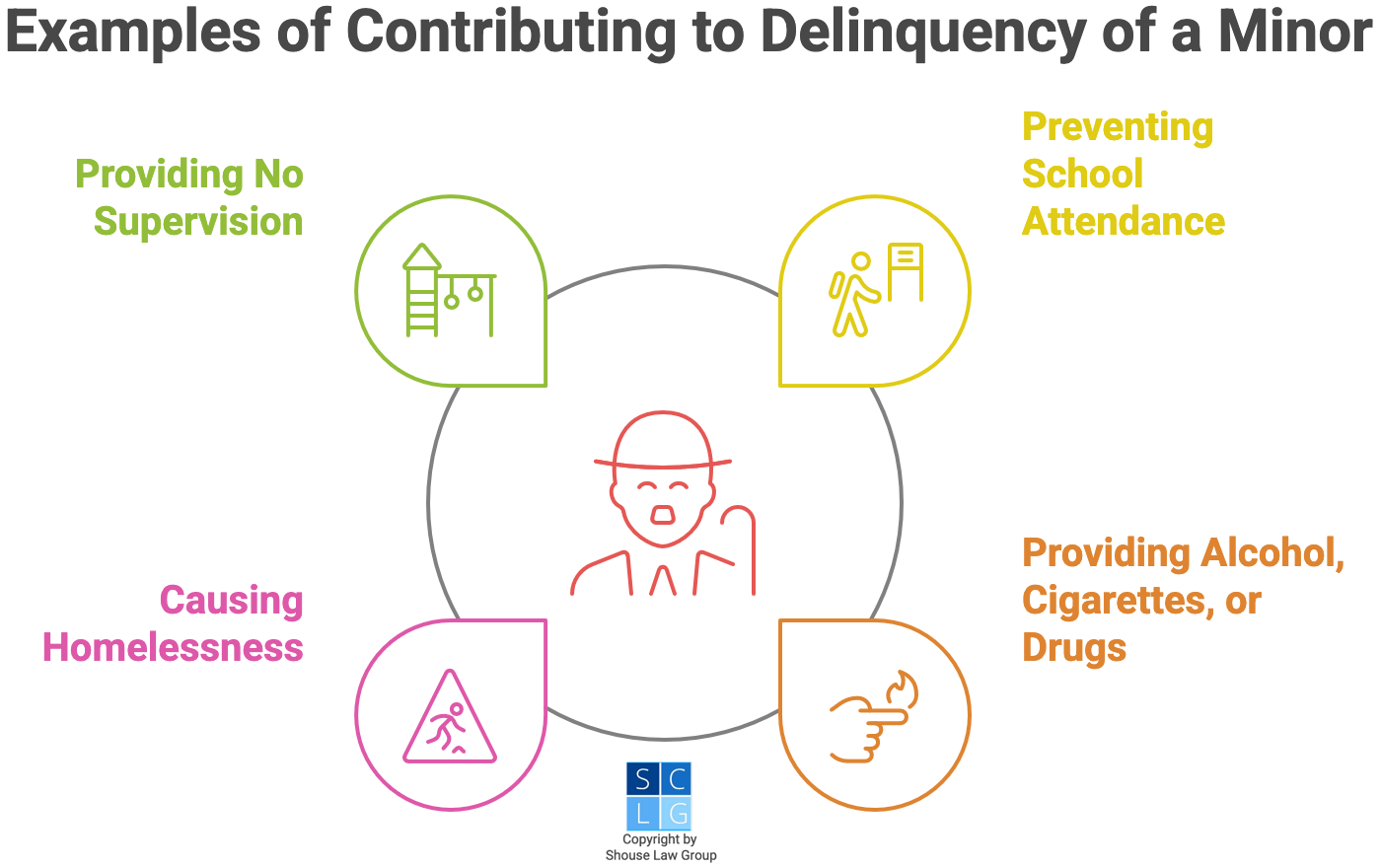
You commit the criminal offense of contributing to the delinquency of a minor when you:
- commit some act or fail to act in a certain way, and
- the action or inaction makes a child more prone to engage in illegal activities.
Common examples include:
- allowing your 13-year-old son to stay out after curfew and he gets arrested for underage drinking or DUI,
- letting a 16-year-old neighbor use a spare bedroom to have sex with her 19-year-old boyfriend, and
- furnishing alcohol to a child 12 years of age.
Contributing to the delinquency of a minor is a misdemeanor offense in most jurisdictions (in contrast to a felony or an infraction).
The crime is often punishable by a fine and/or custody in county jail for up to one year.
Below I discuss what you need to know about contributing to the delinquency of a minor. Also listen to our informative podcast:

“Contributing to The Delinquency of a Minor” Defined
The legal definition of contributing to the delinquency of a minor is to commit an act or omission that tends to make a child a juvenile delinquent.1
Most states have criminal laws in place that set forth similar definitions. For example, in California, a prosecutor must prove the following “elements of the crime” to convict you of this offense successfully:
- you committed an act or failed to perform a duty, and
- in doing so, you caused or contributed to causing a minor to become a delinquent child, a habitual truant, or a dependent of the juvenile court.2
Similarly, people in Colorado will face charges of contributing to the delinquency of a minor if they induce, aid, or encourage a child to violate any:
- federal or state law,
- municipal or county ordinance, or
- court order.3
Penalties
Most states say that the crime of contributing to the delinquency of a minor is a misdemeanor offense.4
The crime is typically punishable by:
- a fine, and/or
- custody in jail for six months to a year.
Note that most jurisdictions allow judges to grant misdemeanor probation in lieu of imposing jail time.
Best Defenses
Fortunately, yes. Common defenses that you can raise to contest a charge of contributing to the delinquency of a minor charge are:
- the charge is based on false accusations,
- the “child” in question was at least 18 years of age,
- the child acted outside of your control,
- law enforcement arrested you without probable cause.
Please know that you should consult with a criminal defense attorney to learn the best defense that applies to your specific criminal charges.
Note that most criminal defense lawyers and criminal law firms offer free consultations. A free consultation means you can receive legal advice at no cost.
Note that the attorney-client relationship also protects your communications with a lawyer. This means your attorney cannot disclose your communications without first gaining your consent.
Child Abuse Distinguished
No. Contributing to the delinquency of a minor is a separate and distinct crime from child abuse.
You will typically face child abuse charges if you willfully inflict either of the following on a child under 18 years of age:
- any cruel or inhuman bodily punishment, or
- an injury that results in a traumatic condition.5
Child abuse can lead to a felony charge punishable by several years in jail or state prison.
Legal References:
- Black’s Law Dictionary, Sixth Edition – “Contributing to delinquency.”
- CALCRIM No. 2980 – Contributing to Delinquency of Minor, Judicial Council of California Criminal Jury Instructions (2020 edition). See also In re Autumn K (2013) 221 Cal.App.4th 674; and, California Penal Code Section 272 PC.
- CO Rev Stat 18-6-701 (2016). The language of the statute reads that:
(1) (a) Any person who induces, aids, or encourages a child to violate any state law that is a felony victims rights act crime as defined in section 24-4.1-302(1) commits first degree contributing to the delinquency of a minor. (b) Any person who induces, aids, or encourages a child to violate any municipal or county ordinance, court order, or state or federal law that is not a felony victims rights act crime as defined in section 24-4.1-302(1) commits second degree contributing to the delinquency of a minor. (c) As used in this section, the term “child” means any person under the age of eighteen years. (2) (a) First degree contributing to the delinquency of a minor is a class 4 felony. (b) Second degree contributing to the delinquency of a minor is a class 1 misdemeanor. (3) When a person is convicted, pleads nolo contendere, or receives a deferred sentence for a violation of the provisions of this section and the court knows the person is a current or former employee of a school district in this state or holds a license or authorization pursuant to the provisions of article 60.5 of title 22, C.R.S., the court shall report such fact to the department of education. - See, for example, Florida Statute 827.04 (2021).
- See, for example, California Penal Code 273d(a). See also People v. Whitehurst (1992) 9 Cal.App.4th 1045.

